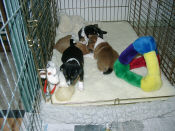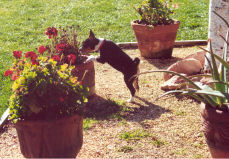When are Basenji puppies are available? Basenjis usually only come in season once a year and that is late summer to early fall. Puppies are usually born late fall to early winter. (Not all of them read the book however, but it is pretty much a general rule). If you are looking for a summer puppy, this will not be the breed for you in the US. Responsible breeders normally have a reservation list before the puppies are even born, so if you are not patience enough to wait, this may not be the breed for you. Getting a puppy as your new family member should never be a "snap" decision. Take your time and research, talk to breeders, visit with breeders and then when you do get your puppy, you will have chosen wisely as your new companion will be with you a very long time. Basenjis can be good for people that have allergies but they are not hypoallergenic. Best way to find out is to spend time with Basenjis in their home.
SO, you want a Basenji? Here are some questions you should think about first....... as Basenjis are not everyone's type of dog. You have heard they don't bark? Well they can, however, they choose not to. It is usually a single bark, more like a cross between a Bark & Woof. But make no mistake, they are not mute by any means. They growl, howl, "scream" when really upset to the point it will raise the hair on the back of your neck. And when happy (or trying to get themselves out of trouble) have the most wonderful yodel.....
1. Do you have a sense of Humor?
A sense of humor is "required" for any Basenji owner. Expect the unexpected daily.... A Basenji is called the "thinking" dog and will try to outsmart you at least once a day.... They are not obedient as they consider the options before committing to a task. Are you willing to laugh at yourself when your Basenji gets the best of you?
2. Is your home life pretty hectic right now with small children, work, and lots of activity? Do you need to be away from home many hours each day because of your job or because you travel?
Maybe this is not the best time for any dog. A dog is a new family member and requires as much time as your children in order to properly socialize, housebreak, and train. And a Basenji is like having a Two Year Old that never grows up.... Even at age 10, they can revert back to the Terrible Twos! A Basenji does not do well left on its own for hours on end. He/She will think of things to do...
3. Are you willing to crate train?
This is a must for a Basenji and for any breed as far as I am concerned. It becomes a safe and happy place for your Basenji and a place you can always be sure they are secure.
4. Are you willingly to accept that a Basenji is a Sighthound, therefore can never be trusted off lead?
They chase what they see.... cars do not mean danger. They have no clue that cars kill! You have to be willing to make your house and yard secure. An open front door is an opportunity to pursue what they see or think they see.....
5. Are you willing and able to put the time and effort into proper socialization of your Basenji? And are you ready for a dog that will challenge you to become top dog in the home? It is important that you put the time into socialization of your Basenji. Your breeder will have started the process but you need to be willing and able to continue that process. The Basenji standard says "Aloof with Strangers" and they can be. A Basenji is not a Lab or a Golden that loves every strange person they meet. But socialization as a young pup goes a long way in the temperament of your Basenji.
These are just a few things to think about and things you should discuss with your breeder. A good, reputable breeder will be honest with you and if a Basenji might not be the right breed of dog for you, they will tell you so.
BASENJI APPEARENCE
Basenjis come in four basic coat colors, Red & White, Black & White, Black, Tan & White (or Tri colored) and Brindle & White. The Basenji is a small, shorthaired hunting dog from Africa. It is short backed and lightly built, appearing high in the leg compared to its length. The wrinkled head is proudly carried on a well-arched neck and the tail is set high and curled. Elegant and graceful, the whole demeanor is one of poise and inquiring alertness. The balanced structure and smooth musculature enables it to move with ease and agility. The Basenji hunts by sight but also can hunt by scent. The Wrinkled forehead, tightly curled tail and effortless gait (resembling a racehorse trotting full out) are typical of the breed.
This is from the AKC Standard for the Basenji. The full standard can be found on the American Kennel Club Web Site.
As with any written standard, each person reads it differently and each breeder will decide what is the most important part for him or her.
BASENJI HEALTH CONCERNS
Basenjis are generally a hardy, happy dog but as with all pure bred dogs, there is a risk of genetic problems. Because it is a pure bred from a reputable breeder, they are aware of these potential problems and are able to advise potential Basenji owners about them. No purebred is without problems. The question then becomes being honest about them, testing for what we can, and sharing that information between breeders for the better health of the Basenji. If you visit with a breeder and they tell you they don't have to test because they know their Basenjis are healthy, I would advise you to find a different breeder or at least ask for the information they have to back up this claim. Saying that all my dogs are healthy, is not the right answer in my book, test data from parents, grand parents, sibling, and off spring is..... And it is VERY important to do health testing on your Basenji, regardless if your Basenji is for show, breeding, or your family pet. If a breeder says they never heard of Fanconi (9/12/11 BCOA announces Direct DNA Fanconi Test) , PRA (Progressive Retinal Atrophy), IPSID, HA (Hemolytic Anemia, we do have a genetic test for HA), HD (Hip Dysplasia, or Thyroid, you need to find a different breeder. Any reputable breeder is aware of ALL health concerns in the breed. I have listed an overview of the biggest concerns in our breed and links to more information about them. You should always check health results for yourself, most results can be found at www.offa.org
September 12, 2011 - Direct DNA Genetic Test for Fanconi is released
It is typically late onset (age 3 to 5 and older) and caused by a "Late Acting Recessive Lethal Gene". There is no cure for Fanconi, but there is a Fanconi Management Protocol, developed by Dr Steve Gonto. It is important that Fanconi is diagnosed early and that you act quickly because the sooner the syndrome is caught and the supplementation starts, the better chance your Basenji has. There are a number of Basenjis living a long and good life because of Dr. Gonto and his Fanconi Protocol. Symptoms include frequent drinking, frequent urination, dehydration, weight loss, poor hair coat, and bone pain. ALL BASENJI owners should strip test their Basenji at least once a month using a Glucose test Strip for sugar in the urine. If found, see your Vet immediately for further tests and be sure that he/she has a copy of the Fanconi Protocol. It your Vet is not familiar with Fanconi, Dr. Gonto is available for consultation. It is important Blood Gases are done as soon as possible after your Basenji has been diagnosed so the correct supplements can be given. Blood Gases are usually repeated every six months. If you find that your Basenji has Fanconi, be sure that you inform the breeder.
EYE ABNORMALITIES
Membrane covering the eye during development. Usually disappears shortly before birth but sometimes a part of the membrane remains and can be seen over some part of the pupil. This is not a life-threatening problem, as many Basenjis have 1 or 2 stands of PPM connecting Iris to Iris. If the PPM is covering more of the eye, this is a concern to breeders, but will not effect the quality of life for the Basenji and visual impairment due to PPM is just about unheard of.
UPDATE REGARDING DNA TESTING FOR PRA, MARCH 18, 2013 - DNA cheek swab test for the recessive gene is NOW available that is responsible for 50% of PRA in Basenjis. Go to www.offa.org to order the test. For more information about PRA and testing please go to www.basenji.org
A serious eye problem in our breed as it will cause a dog to go blind, Again, like Fanconi, PRA is late on-set, usually after the age of 5 years.
Not as big a problem in Basenjis as it is with other breeds. After a few Basenjis were diagnosed, breeders began to OFA all their Basenjis. Both the Sire and Dam should be OFA'ed before breeding to insure that this problem remains a minor one in our breed.
Since we have a genetic test for HA there is no reason that a Basenji should ever suffer from Hereditary Hemolytic Anemia.
Typical symptom of ISPID is diarrhea, along with prolonged loss of appetite and weight loss. The disease appears to affect multiple organ systems including skin, liver, endocrine system, immune system and gastrointestinal tract.
The Basenji thyroid functions a bit differently then other breeds. The Basenji has a more active thyroid than other breeds and uses up the hormones produced by the thyroid much more rapidly then other breeds. Thyroid should be checked once a year after the age of two. Regular blood tests do not do a full thyroid screening and usually need to be sent out to one of a handful of labs. This can be controlled very easily by medication.


ABOUT BASENJIS AND BASENJIS HEALTH
Tanza Basenjis will test for Fanconi using the Direct DNA Test for any and all Future Breedings